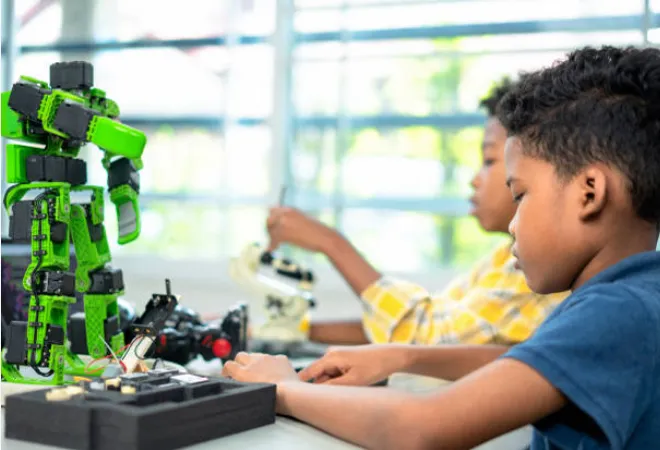
This summer break, 700 plus voluntary mentors, 30 plus industry leaders, and 10 plus private technology companies came together to help 9,000 students learn entrepreneurship online. Spread across nine weeks, seven languages, and 35 Indian states, the ATL Tinkerpreneur Bootcamp is one of the largest interventions in the world to address the education crisis extravagated by the pandemic.
The way a student spends their summer vacation has a disproportionate impact on their academic performance. Research on this phenomenon of ‘summer loss’ goes back to 1906; and looks at the relationship between summer vacation activity and test performance of students. Popularly known as the ‘faucet theory’, it claims the “resource faucet” is similar for all students during the academic year. However, over the summer, the flow of resources slows for students from disadvantaged backgrounds. On the other hand, higher-income students tend to continue to have access to financial and human capital resources (such as parental education), thereby, facilitating learning.
Similarly, research by Prof. Raj Chetty from Harvard University looks at the ‘Lost Einsteins’ in the United States and shows us that innovation is not something that students ‘naturally’ have. Rather, it is something they ‘nurture’ based on the child’s environment and their exposure to technology.
Spread across nine weeks, seven languages, and 35 Indian states, the ATL Tinkerpreneur Bootcamp is one of the largest interventions in the world to address the education crisis extravagated by the pandemic.
In 2021, as students all over the world complete over a year of online schooling, the threat of educational divide caused by the ‘summer loss’ and ‘lost Einsteins’ is now more prominent than ever.
The ATL Tinkerpreneur Bootcamp
The Atal Innovation Mission (AIM) is the government of India’s strategic initiative to scale innovation and entrepreneurship in the country. Within AIM, the Atal Tinkering Lab (ATL) programme is designed to enable a generation of neoteric innovators in the country. Over the last year, as learning in Atal Tinkering Labs, facilitated by a community of voluntary ‘Mentors of Change’, went online and opened a new world of opportunities for creating digital learning experiences for the 1.6 million students who engage with the Atal Tinkering Labs. With this in mind, the initial seeds of the Tinkerpreneur were sown. A nine-week long cohort-based bootcamp was designed to take innovation and entrepreneurship to students during the summer.
The Internet has the unique ability to centralise and decentralise at the same time. Keeping this at the heart of the ATL Tinkerpreneur Bootcamp, it was designed to centralise teaching by top industry leaders at scale and decentralise access to personalised mentoring to each-and-every student. It also provided a balance between live real-time learning and interaction, and a self-paced curriculum to ensure that no student was left behind. At the end, three key pillars emerged.
Research by Prof. Raj Chetty from Harvard University looks at the ‘Lost Einsteins’ in the United States and shows us that innovation is not something that students ‘naturally’ have. Rather, it is something they ‘nurture’ based on the child’s environment and their exposure to technology.
First, live classes by the top industry experts for all students. Four to six live sessions were held in all nine weeks of the bootcamp. They covered themes ranging from refining digital products to designing marketing strategies. Taught by leading entrepreneurs, professors, and technology leaders, students learnt the latest insights from the best. These live sessions were conducted in seven different languages.
Second, personalised mentoring and guidance for each student. The 700 plus mentors who had volunteered for the bootcamp were mapped to 13-15 student teams each. Through the course of the bootcamp, mentors conducted personalised sessions to help the specific learning requirements of the students. Considering all of them are working professionals, they brought their personal insights and professional knowledge in grooming and supporting their mentees in the Bootcamp.
Third, all mentors and students had access to a portal which had self-paced learning resources which they could access any time. The resources included step-by-step guides, video lectures, and open-source content.
A case for global collaboration to find the lost Einsteins
The Internet and the ‘glocal’ (global and local) nature of the 21st century makes a quest to find the ‘lost Einsteins’ and cover the summer-local collective challenge. The ATL Tinkerpreneur becomes a powerful case study in the potential of enabling education on the cloud.
The Tinkerpreneur Bootcamp shows specific ways in which it can be addressed.
Lack of personalised attention, support, and customisation has been the biggest online learning so far. The Tinkerpreneur Bootcamp shows specific ways in which it can be addressed. Building upon the learnings for the bootcamp and connecting it to the larger vision of driving economic progress through innovation, we recommend:
First, the power of partnership and collaboration. The true power of Atal Innovation Mission is creating a platform for diverse stakeholders to come together to enable innovation and entrepreneurship. From bilateral collaborations with countries like Russia, Singapore, and Sweden to partnerships with Big Tech companies and leading start-ups. Even in the Tinkerpreneur Bootcamp, professionals from leading tech companies, professors from top colleges, and ambitious entrepreneurs came together to make the bootcamp possible.
Second, finding relatable mentors. The ‘Lost Einsteins: Who Becomes an Innovator in America’ research shows that childhood exposure is the biggest driver of innovation; and mentorship is one of the most powerful ways of achieving it. In the Tinkerpreneur Bootcamp, we took region and language as key determinants in leading mentor-mentee matching. This ensured that students received guidance from people who could contextualise the learning on the basis of a student’s background.
The true power of Atal Innovation Mission is creating a platform for diverse stakeholders to come together to enable innovation and entrepreneurship.
Third, focus on the curriculum and pedagogy. The internet provides a beautiful opportunity to centralise the best learning resources and content in a way that students can access at their convenience; while allowing for decentralisation of mentorship to ensure personalised guidance. The Tinkerpreneur Bootcamp was designed keeping this centralisation and decentralisation in mind.
To bridge the talent opportunity gap that exists globally, driving innovation is an important facet. It requires us to take a bottom-up global approach to address it. The World Economic Forum’s Future of Work 2020 report tells us that in the next decade 85 million jobs will disappear. They will be replaced by 97 million new jobs for which we will need to work to empower and train people. Bootcamps like Tinkerpreneur will be a key engine to drive this learning.
The views expressed above belong to the author(s). ORF research and analyses now available on Telegram! Click here to access our curated content — blogs, longforms and interviews.




 PREV
PREV


